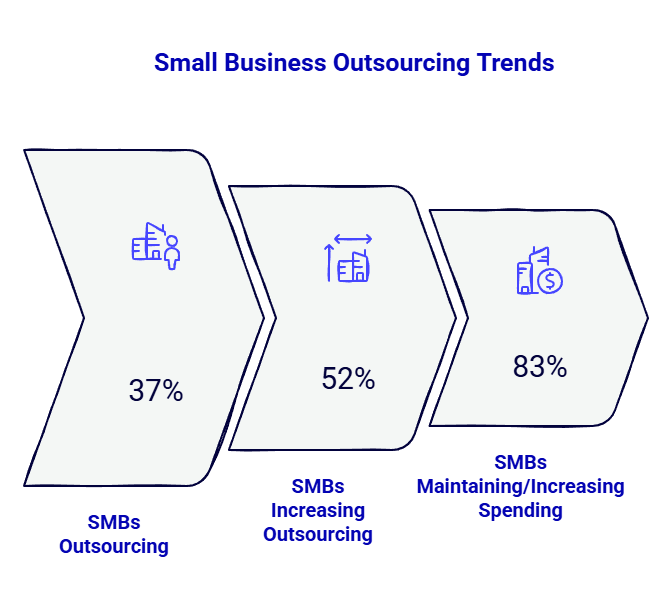A Business Process Outsourcing (BPO) strategy is a structured plan for outsourcing “specific business processes” to external service providers. Through outsourcing, consumer brands and D2C companies can reduce costs, access specialised skills, and improve operational efficiency.
At some point, every growing company must delegate. Outsourcing is no longer just a cost-saving tactic, it’s a growth enabler. It allows small and midsize businesses to:
- Save up to 60% compared to in-house teams
- Access specialised skills
- Stay competitive
Due to these benefits, the global BPO market is projected to reach $525 billion by 2030.
However, it’s not without its challenges! A promising outsourcing deal can turn into a costly setback because of:
- Communication breakdowns
- Loss of quality control
- Data security risks
- Poor vendor selection
These issues are particularly pronounced for small businesses! That’s because they usually have limited resources and experience in outsourcing. But does this mean you opt for a conservative mindset? No! In today’s cut-throat competition, taking risks and small business outsourcing are a necessity. Smart outsourcing is essential for sustainable growth and operational resilience.
Need help? In this article, let’s study seven proven BPO strategies you can adopt to achieve strong business growth and efficiency. Also, we will see some popular small business outsourcing trends and 5 common challenges in small business outsourcing, along with their solutions.
Popular Small Business Outsourcing Trends You Must Know in 2025

Recent surveys show that smaller organizations are increasingly outsourcing to optimize operations and improve CX. Among them, Marketing, IT services, and design are emerging as top investment priorities, with:
- 27% planning to invest in marketing
- 22% focusing on IT
- 21% prioritising design services
Want to gain more insights? Let’s check out these trends:
a) How Common Is Small Business Outsourcing?

Business process outsourcing services for startups are highly popular. Studies show that about 37% of small businesses outsource at least one business function. And, 52% plan to increase outsourcing soon.
All this is happening despite economic uncertainty! In 2024, 83% of SMBs either maintained or increased BPO spending in 2024, even during economic challenges.
b) What are the Most Popular Outsourced Functions?
The most common tasks small businesses outsource are:
- Accounting and IT services: 37%
- Digital marketing: 34%
- Software development: 28%
- Human resources and customer support: 24% each
c) What are the Motivations for Small Business Outsourcing?
Some top reasons cited for outsourcing in small businesses are:
| Reasons | Vote % |
| Access to flexible resources | 33% |
| Saving time and improving efficiency | 27% |
| Working with experts | 26% |
| Business growth | 19% |
Another study shows that 24% of SMBs cite improved efficiency as their main reason for outsourcing. It is followed access to expertise (18%) and operational flexibility (16%).
Want to Boost Efficiency and Growth? 7 BPO Strategies You Can Adopt in 2025!

We are living in an era driven by AI, automation and data-led decisions! The adoption of advanced technologies (such as AI and automation) is expected to further boost the efficiency of small business outsourcing. Studies show that about 70% of customer service companies will use AI by the end of 2025.
So, have you developed your BPO strategy yet? Don’t lag! Below are seven popular ways you can achieve growth and efficiency through small business outsourcing:
1. Modern BPO Offers AI and Automation Integration Services
Nowadays, small businesses are hiring BPOs that offer AI tools and automation. This allows them to handle routine tasks, such as:
- Data entry
- Answering customer questions (AI-powered customer support)
- Scheduling appointments, and more.
Modern BPOs now provide AI systems like chatbots and virtual assistants. They work around the clock to:
- Manage large numbers of requests
- Respond to customers based on their past interactions
- Free up human agents to focus on strategic CX initiatives
Case in point: Atidiv helped an NYC start-up achieve 80% time savings, 50% cost reduction, and 99% accuracy by integrating AI-based automation in their operations.
2. Win Customers with Customer Experience (CX) Focused BPOs
Customer experience specialist BPO companies, like Atidiv, are now helping businesses to prioritize the customer journey. They provide omnichannel messaging solutions, where customer support is offered through various channels such as:
- Phone (both inbound and outbound call center services)
- Email services outsourcing
- Back office outsourcing services
- Social media support
- Live chat service or website
This approach ensures that your customers can get help in the way they prefer!
Additionally, CX-related BPO strategies also cover the development of self-service tools like FAQ pages and automated phone systems. They allow customers to resolve common issues on their own. Personalized, responsive CX builds loyalty, reduces churn and improves your Net Promoter Score (NPS).
3. Predict, Plan, and Perform With BPOs
Today’s tech-savvy BPOs perform predictive analytics for their clients. It involves analysing customer interactions and historical trends to make future predictions. BPO providers use this method to:
- Plan staffing levels during busy periods
- Understand how customers feel about their service
To increase the efficiency of your small business, BPO companies study customer interactions. This lets them:
- Spot patterns
- Identify potential problems
- Adjust staffing as needed
Additionally, some BPOs also use “sentiment analysis”. This technique detects areas where employees might need additional support. This BPO strategy helps small businesses respond to issues before they escalate and maintain a higher quality of service.
Atidiv’s analytics-backed BPO services empower clients to predict customer behavior and improve retention which results in measurable ROI.
4. Prefer Hybrid (Onshore + Offshore) BPO Models
An ideal BPO strategy is to prefer Hybrid BPO models to ensure cost savings with quality assurance. In this, you use a combination of:
- Onshore
- Nearshore
- Offshore outsourcing
Complex tasks that require specific language or cultural knowledge can be managed onshore. Whereas repetitive or high-volume work can be handled offshore to save costs. This setup balances quality and cost.
As a small business owner, through this BPO strategy, you can quickly scale during peak seasons and spread risk across different locations.
5. Develop a Remote and Distributed Workforce with BPOs
Remote work is the new normal! Studies show that by the end of 2025, about 32.6 million Americans projected to work remotely by 2025. This number represents about 22% of the American workforce!
For your small business, BPO providers can hire talent from different regions. This allows you to:
- Operate around the clock
- Access specialised skills
Through this BPO strategy, you can gain access to expertise without the cost of setting up physical offices. Additionally, remote work can reduce expenses and improve employee satisfaction. That’s because workers can operate from lower-cost regions or home offices.
6. Guard Your Digital Gates! Achieve 100% Data Security with BPOs
Data security is a critical concern in BPO partnerships! Studies show that by Q3 2024, over 422 million data records were exposed globally. Thus, most small businesses are apprehensive about outsourcing, particularly when it comes to handling sensitive information.
Here, the best small business outsourcing approach is to ensure that your hired BPO partners have strict security measures in place, such as:
- End-to-end encryption
- GDPR/CCPA compliance
- Role-based access controls
This BPO strategy protects customer data and prevents breaches.
Atidiv’s security-compliant frameworks protect client data and have helped businesses avoid losses exceeding $450K annually (Read case study).
7. Go Beyond Outsourcing! Form Strategic Partnerships in 2025
Modern BPO isn’t just about outsourcing, it’s about collaboration and innovation.
In 2025, most BPO providers are forming strategic partnerships with their clients rather than just completing specific tasks! They are working together with small businesses to:
- Develop solutions
- Share risks
- Align on long-term goals
Additionally, modern BPOs are offering specialised services such as:
- Advanced data analysis
- Cybersecurity
- Industry-specific support
This BPO strategy again helps small businesses as they can access expertise and technology without having to build these capabilities in-house.
Example: Atidiv enabled $20M+ in savings and 95%+ quality for a global business aggregator.
5 Common Challenges in Small Business Outsourcing

When it comes to outsourcing in small businesses, cost remains the biggest challenge! Studies show that about 23% of small businesses cite high costs as a primary concern when outsourcing. Besides cost, some other challenges are:
| Small business outsourcing challenges | Vote % |
| Communication difficulties with outsourced teams | 21% |
| Missed deadlines | 14% |
| Following instructions | 12% |
To gain more clarity, let’s check out five common challenges in small business outsourcing
1. Communication Gaps and Misunderstandings
-
- Communication problems are common in outsourcing (particularly when working with teams in different countries).
- Differences in language, time zones, and work cultures cause misunderstandings or delays.
- These issues lead to:
- Unclear instructions
- Unmet expectations
- Project delays
Solution
To avoid this, you should schedule regular check-ins. Also, document all requirements clearly and use communication tools that keep everyone on the same page.
2. Loss of Quality Control
- Most small businesses often worry about losing control over the quality of work when outsourcing.
- This is a major concern for tasks that:
- Directly impact customers
- Require specific expertise.
- Please note that without direct oversight, quality becomes inconsistent.
- Also, the work does not align with the business’s standards.
Solution
You should set clear quality benchmarks. Also, maintain regular feedback channels with the outsourcing partner.
3. Hidden and Unexpected Costs
- Usually, small business outsourcing is seen as a cost-saving measure.
- However, unexpected expenses can add up!
- Some additional costs that you can incur are:
- More management time spent
- Extra training
- Unplanned service fees.
- In some cases, small businesses even miss important contract details that lead to budget overruns.
Solution
As a small business owner, you must review contracts carefully. Also, perform a detailed cost analysis to prevent financial surprises.
4. Data Security and Confidentiality Risks
- Small business outsourcing requires you to share sensitive information with third-party vendors.
- This increases the risk of:
- Data breaches
- Intellectual property theft
- Non-compliance with data protection laws.
- Additionally, some small businesses lack the resources to thoroughly assess a vendor’s security practices.
Solution
To protect data, you should enforce strict security protocols. You can ask your vendor to sign confidentiality agreements.
5. Choosing the Wrong Outsourcing Partner
- Selecting the wrong vendor leads to:
- Poor results
- Missed deadlines
- Wasted resources
- Misfit in the company culture
- When you choose a vendor without proper experience, they usually overpromise and underdeliver.
Solution
To avail of the best business process outsourcing solutions for small businesses, you should:
- Conduct thorough research
- Check references
- Ensure both parties clearly understand the project objectives
Looking for a Reliable BPO Partner? Hire Atidiv in 2025!

For small businesses, outsourcing is a strategic advantage! It lets you cut costs and access specialised expertise. Also, by delegating routine tasks, your staff frees up time to perform more strategic work.
However, to gain the most, you must approach outsourcing strategically. Try to avoid:
- Communication gaps
- Quality control issues
- Hidden costs
- Data security risks
Also, perform due diligence and select the right BPO partner, who really helps! We at Atidiv are customer experience specialists.
By partnering with Atidiv, you gain access to:
- End-to-end customer support solutions (voice, chat, social, back office)
- Data-driven insights for continuous improvement
- Cost savings up to 60%
With over 15 years of experience and a 4.8 CSAT rating,, Atidiv can manage your entire customer service department.
Our team:
- Handles high ticket volumes
- Tracks critical KPIs
- Delivers omnichannel messaging solutions
Scale Smarter with 60% Lower Costs — Partner with Atidiv Today.
FAQs On BPO Strategy
1. How do I maintain quality control when outsourcing?
You should:
- Set clear quality benchmarks (include them in your BPO strategy)
- Regularly monitor performance
- Maintain open communication with your outsourcing partner
Also, request regular updates and track major KPIs. Be aware that a reliable BPO provider, like Atidiv, will align with your brand standards and adjust based on your input.
2. How can I ensure data security when outsourcing sensitive tasks?
Always choose a BPO provider with strong data protection measures, such as:
- Encryption
- Compliance with data privacy laws
Also, require your vendors to sign confidentiality agreements.
3. What if the small business outsourcing partner misses deadlines?
To prevent delays, your BPO strategy should:
- Contain clear timelines
- Define consequences for missed deadlines in the contract
Additionally, schedule regular check-ins to track progress. Always choose experienced vendors with a proven track record of meeting project timelines.
4. How do I know if a BPO partner is the right fit for my business?
Research the potential small business outsourcing partners thoroughly. While researching, specifically look for their:
- Total experience
- Industry expertise
- Client reviews
Before hiring, request case studies and ask for references. Lastly, evaluate whether they can meet your specific needs. If the BPO partner falls within your budget, hire them!

